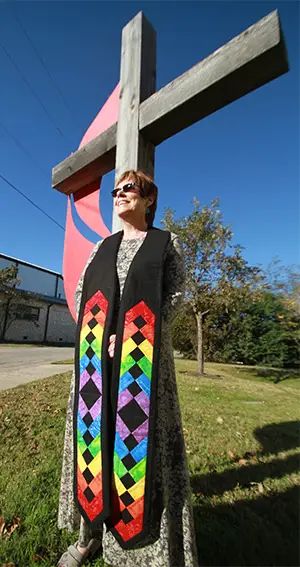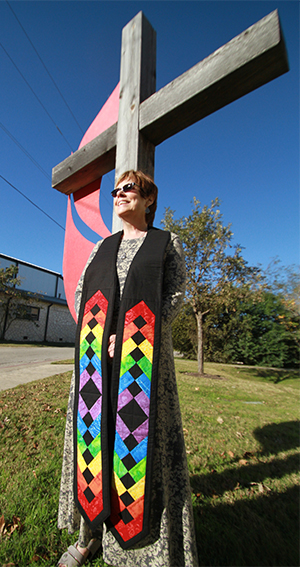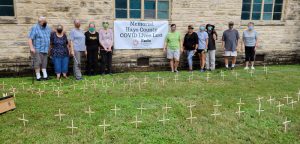
[dropcap]T[/dropcap]hings are changing in the United Methodist Church.
And this church is not alone. As congregations begin opening their arms to gay members performing wedding ceremonies, baptisms and more, some of the traditional denominations are questioning their members churches.
Earlier this month, the First Baptist Church of Austin was expelled from the Texas Baptist Convention of Texas for its decision to open its doors to the lesbian, gay, bi-sexual and transgender (LGBT) community.
 (pho...
(pho...[dropcap]T[/dropcap]hings are changing in the United Methodist Church.
And this church is not alone. As congregations begin opening their arms to gay members performing wedding ceremonies, baptisms and more, some of the traditional denominations are questioning their members churches.
Earlier this month, the First Baptist Church of Austin was expelled from the Texas Baptist Convention of Texas for its decision to open its doors to the lesbian, gay, bi-sexual and transgender (LGBT) community.
 (photo by Moses Leos III)
(photo by Moses Leos III)
The local Methodist churches – Buda and Kyle – may have to make their own decisions soon about their connection to the church at large.
Or, at the very least, they are having the conversations about what kind of changes must be made within the next few years.
As society now accepts LGBT members, the Methodist church, like so many other protestant denominations, is struggling with inclusion, what is allowed, and what ministers can and should do.
And the people left wondering about where they stand are the very people that society in general, to some degree, are just now beginning to embrace.
The local discussion recently was brought to the attention of church members when the Buda United Methodist Church, through its Reconciling Ministries Network, showed a film, “An Act of Love.” The Kyle United Methodist Church has showed the film earlier this summer.
While most of the film centers around Dr. Frank Schaefer, who was defrocked in late 2013 and reinstated as a Methodist minister in mid-2014, the movie’s theme looks at the changes and struggles the church – and its many gay and lesbian ministers and members – are going through.
The changes in the church, though, are likely to come to head in 2019, when an international church commission decides how it will deal with ministers who perform gay marriages, and whether it will allow its many members to be married in the very church where they participate, support monetarily, teach Sunday school, and help run.
It will be a big year, and as the international commission makes its decision, so that decision will strike down to the local level, and the Buda and Kyle Methodist churches will be forced to decide how to proceed.
The movie
Frank Schaefer always wanted to be a minister. He went into engineering to follow in his father’s footsteps. However, he decided that engineering was not for him and finally went into the ministry.
Like many Methodist ministers, he was assigned and moved through various churches. His children, including son Tim, attended church, studied in Sunday school and went to church camps.
Tim, the oldest of four Schaefer children, attended a conference as a youth. During that session, the LBGTQ policy of the church came up, even as the young teen questioned his own sexuality.
“I prayed to God … ‘make me normal and let this phase end,’” Tim said, adding that he thought about killing himself, as he could not equate his internal feelings with the teachings of his church.
Finally, in 2000, Tim told a classmate that he was gay. That friend’s mother, knowing that Tim was having suicidal thoughts because of the conflicts with the church, called Tim’s parents and told them what was going on.
Frank Schaefer said he and Tim’s mother sat the young man down, asked him whether he was gay, and then embraced him.
With the support of his family, Tim grew up with the understanding that he was gay. It was much later when Tim brought home his partner, and asked if his Dad would perform their wedding ceremony.
“I decided I would perform the wedding of my son – even if I am defrocked by the Methodist Church,” Frank Schaefer said during the film.
But the chaos for the Schaefer family almost never happened. Nearly six years had passed since the wedding was performed. However, 26 days before the statute of limitations ran out, a member of Frank’s church filed charges within the church, and Frank was brought to “trial” within the Methodist church on two charges – performing a wedding for a gay couple and for disobeying the Book of Discipline, which contains the doctrinal standards of the Methodist Church.
When the verdict came down, Frank said, “I wasn’t emotionally prepared.”
When the decision about what to do with the minister was about to be made, supporters of Schaefer put on rainbow colored stolls. Schaefer said he prayed and asked for guidance, adding that “the words that came out were words that were given to me.”
“I will NOT discriminate against people because of their sexuality,” Schaefer told the panel of judges. And, with that, he pulled out a rainbow-color stoll that was given to him and placed it around his neck.
Schaefer said a huge load was lifted from his shoulders after he told the jury that he would not say that he wouldn’t perform another wedding for a gay couple in the future.
Other supporters and other ministers appealed to the Methodist General Conference, which is held every four years. The LGBT issue comes up time and again, and is expected to be brought up again in 2020.
What’s next?
The United Methodist Church might not be united much longer. A few years ago, the church came out with a new slogan – Open Minds. Open Hearts. Open Doors.
But the idea that the church could close its doors to the LGBT community does not sit well with national and local church members.
In the film, retired Methodist Bishop Melvin Talbert said he feels that the Methodist church does not reflect the open hearts, open doors mentality.
“Our church has been taken over by the religious right,” he said.
Talbert said he knows how it feels to be discriminated against – not as a gay person, but as a black person.
When treating blacks, or women, or gays that way, he said, “that’s discrimination. And it is unjust.”
The problem is that the governing book for the United Methodist Chuch, “The Book of Discipline,” includes language that is considered discriminatory by some of its members. It states that self-avowed practicing homosexuals cannot be certified as candidates for or be ordained as a minister, or be appointed to serve in the church.
Talbert said he believes the language in the book is immoral and unjust and should not be followed.
“I could be wrong, but I doubt it,” he said.
Local members of the Buda United Methodist Church talked about their own dealings with the church and their hope that a more open inclusion policy could in embraced.
Keith and Michelle McComb, local church members, and David Mauzy of Austin led a discussion about church’s future.
Keith McComb spoke about his decision several years ago, when he anticipated that the Texas Methodist Men’s group might not support inclusion of LGBT members. As the head of trustees for several years, he had drafted a resignation letter if the administrative council had not voted unanimously against the proposed language.
With tears in his eyes, Keith McComb talked about how happy he was not to feel like he had to leave his church, as the men’s group shot down the anti-LGBT language.
“I decided to stay and enact change,” he said.
In the meantime, church members wait for the Fall of 2019 when the bishop’s commission will bring forward new language.
Will the LGBT community be included? Only time will tell. But in the meantime, Schaefer continues to be a minister, and the local churches continue to live up to their motto – Open Minds. Open Hearts. Open Doors.












